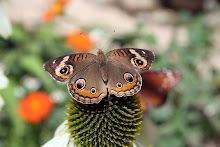
If a vote were taken tomorrow to find the most popular bird in the country, it's doubtful that the cowbird would win. That's because the cowbird has the nasty habit of laying its eggs in other birds' nests.
It all started back in the days when American Bison ruled the Great Plains. At that time a rather nondescript grayish or black bird followed the herds around, feeding on seeds in the abundant supply of buffalo excrement. Settlers on the plains came to calling these animals buffalo birds. But since the birds depended on wandering herds for food, they needed to wander as well if they wanted to survive. The problem, of course, is that wandering birds can't tend their nests. So the buffalo birds decided to leave their young in the care of other birds, an arrangement that seemed to work, at least from the buffalo birds' perspective. Then, during the 1800s, the prairies and buffalo disappeared, replaced by pasture and cattle. But the birds remained and started keeping company with cows instead of buffalo, eating insects in the grass, ticks on the livestock, and seeds and grain. The buffalo bird eventually became known as the cowbird.
A female brown-headed cowbird will watch potential host birds, such as song sparrows, chipping sparrows, phoebes, yellow and chest-sided warblers, and cardinals, as they build nests and begin laying their eggs. In the middle of the host's egg laying period, the female cowbird will sneak into the nest late in the afternoon, remove a host's egg, and then replace it with one of her own at dawn the following morning. Some hosts are hit more than once by cowbirds removing eggs and replacing eggs of their own.
The host birds, apparently unaware that one or more of their youngsters is an alien cowbird chick, will continue the rearing process. Sometimes, the cowbird chick grows faster than the host's own youngsters, and the larger chick may push the smaller chicks out of the nest. In the end, the host parents feed the baby cowbirds as if they were their own, and will protect them against predators until they are large enough to be on their own. From Enature.com
We get these birds around the house quite often. I can always tell they are around before I see them as they have a very high whistle that is very noticeableble. They hang out in in groups in parking lots like Costco with the Brewer's Blackbirds. I have never seen a baby cowbird getting fed by any other of the birds so I guess they don't bring them to the feeders before they are fully weaned or maybe I just haven't been looking at the right time.

No comments:
Post a Comment